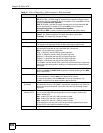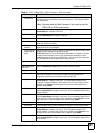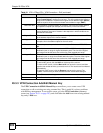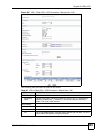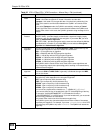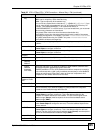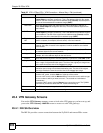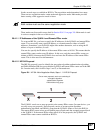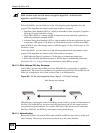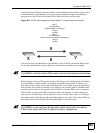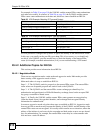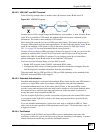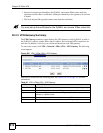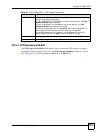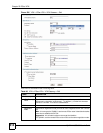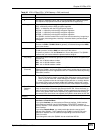
Chapter 20 IPSec VPN
ZyWALL USG 300 User’s Guide
308
" Both routers must use the same encryption algorithm, authentication
algorithm, and DH key group.
In most ZyWALLs, you can select one of the following encryption algorithms for each
proposal. The algorithms are listed in order from weakest to strongest.
• Data Encryption Standard (DES) is a widely used method of data encryption. It applies a
56-bit key to each 64-bit block of data.
• Triple DES (3DES) is a variant of DES. It iterates three times with three separate keys,
effectively tripling the strength of DES.
• Advanced Encryption Standard (AES) is a newer method of data encryption that also uses
a secret key. AES applies a 128-bit key to 128-bit blocks of data. It is faster than 3DES.
Some ZyWALLs also offer stronger forms of AES that apply 192-bit or 256-bit keys to 128-
bit blocks of data.
In most ZyWALLs, you can select one of the following authentication algorithms for each
proposal. The algorithms are listed in order from weakest to strongest.
• MD5 (Message Digest 5) produces a 128-bit digest to authenticate packet data.
• SHA1 (Secure Hash Algorithm) produces a 160-bit digest to authenticate packet data.
See Section 20.4.1.3 on page 308 for more information about DH key groups.
20.4.1.3 Diffie-Hellman (DH) Key Exchange
The ZyWALL and the remote IPSec router use DH public-key cryptography to establish a
shared secret. The shared secret is then used to generate encryption keys for the IKE SA and
IPSec SA. In main mode, this is done in steps 3 and 4, as illustrated next.
Figure 202 IKE SA: Main Negotiation Mode, Steps 3 - 4: DH Key Exchange
DH public-key cryptography is based on DH key groups. Each key group is a fixed number of
bits long. The longer the key, the more secure the encryption, but also the longer it takes to
encrypt and decrypt information. For example, DH2 keys (1024 bits) are more secure than
DH1 keys (768 bits), but DH2 keys take longer to encrypt and decrypt.
20.4.1.4 Authentication
Before the ZyWALL and remote IPSec router establish an IKE SA, they have to verify each
other’s identity. This process is based on pre-shared keys and router identities.
Diffie-Hellman key exchange



